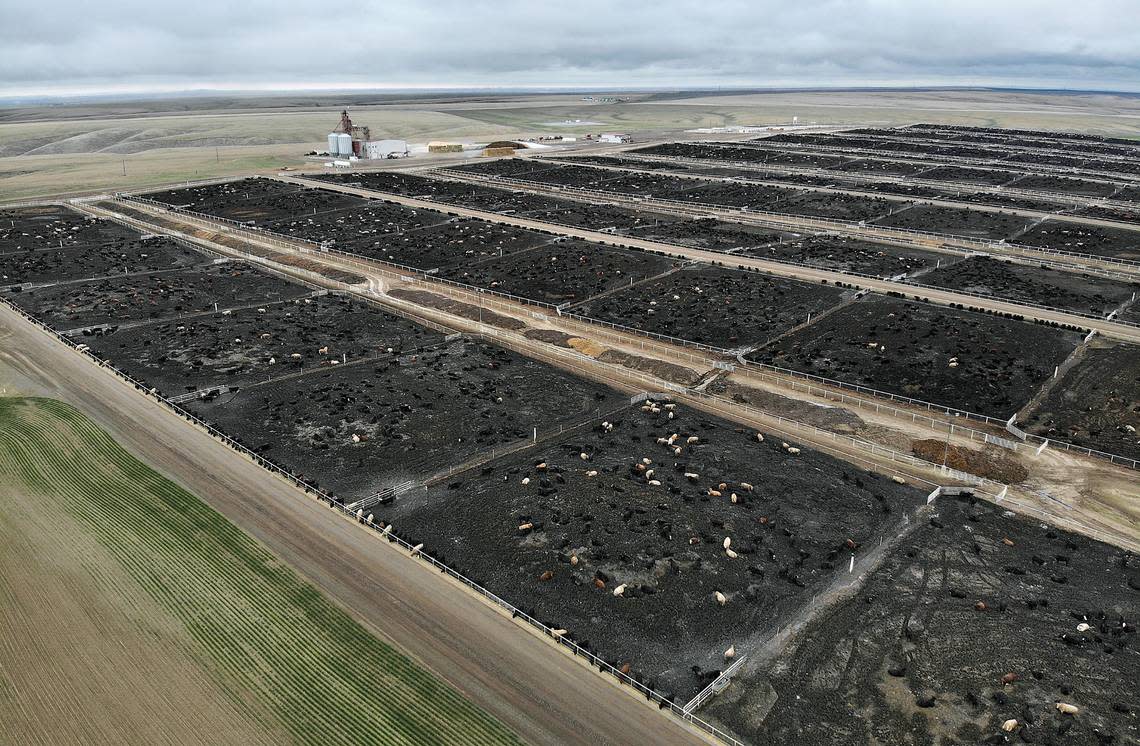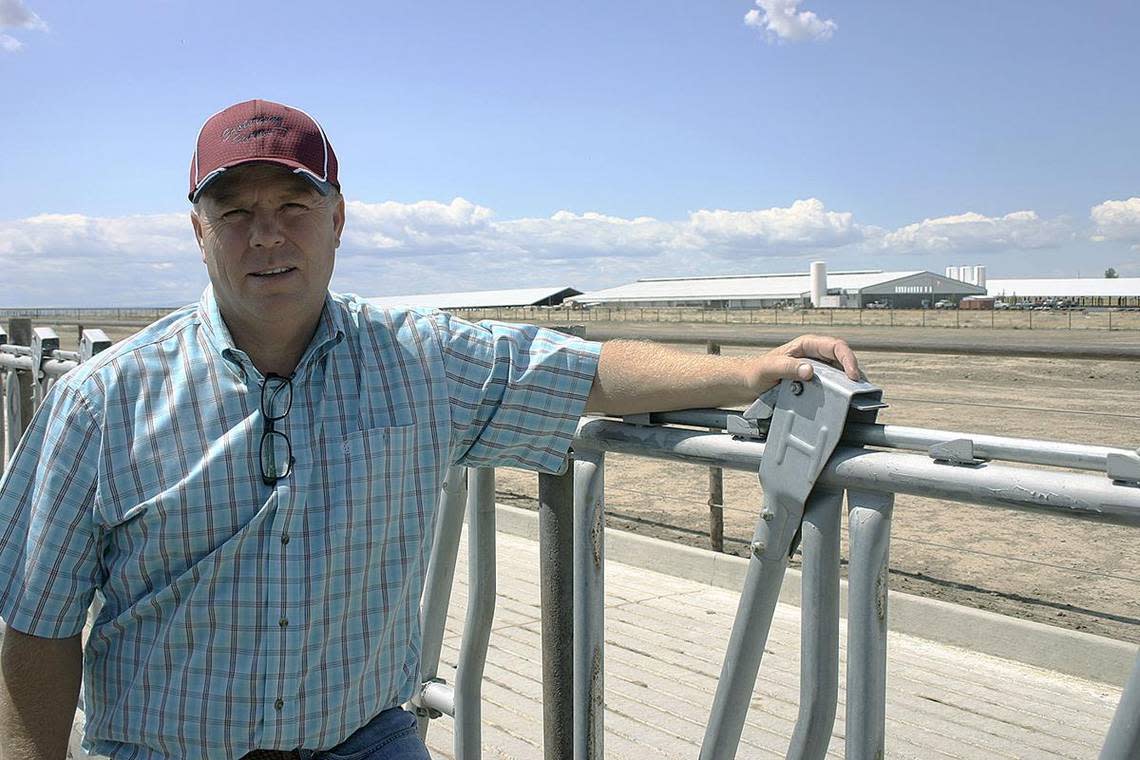‘Ghost cattle’ fraudster Easterday asks 9th circuit to reopen his lawsuit against Tyson
Last month a federal judge dismissed Cody Easterday’s lawsuits against Tyson Foods, seemingly wrapping up his years-long “ghost cattle” fraud legal troubles.
Now he’s asking a federal appeals court to reopen one of the cases, saying he can show Tyson kept using his name and face to sell beef overseas.
Easterday’s attorneys filed an appeal to the Ninth Circuit Court of Appeals this week, seeking to reopen the lawsuit centered on his Cody’s Beef branding deal with Tyson, according to a news release from Easterday.
Judge Stanley Bastian dismissed that case and a second antitrust case with prejudice, meaning they can’t be refiled, but they can be appealed.
The Cody’s Beef branding deal dates back to about 2014 when Easterday entered into an agreement to use his name, photo and the company’s information to sell high quality beef in Japan through Tyson and its customer, Nippon Ham.
Easterday’s attorneys said in the initial filings that the deal was struck with a profit sharing agreement, but he has never been paid for it.
The news release claims that as recently as June 2022 Tyson was still marketing the beef with Easterday’s name and photo. That’s more than a year and a half after Easterday admitted he had defrauded Tyson by charging them for the care and feed of 265,000 head of cattle that never actually existed.
He convicted of one count of wire fraud and being ordered to pay back a total of $244 million. He was also sentenced to 11 years in prison.
Easterday still owes about $170 million in restitution to Tyson and $7.5 million to Segale properties, according to the most recent available court documents.
His attorneys previously estimated the unpaid profits from the branding deal based on sales between 2015 and 2020 could be worth as much as $100 million.
Easterday said Tyson has a history of strong-arming suppliers, pointing to a 2022 judgment in a case between Zia Agricultural Consulting and Tyson.
“The evidence presented at trial supports Zia’s contention that Tyson intended to take advantage of the lack of a written agreement for the benefit of Tyson, then use the lack of a written agreement to pay Zia a lower amount,” U.S. District Court Judge Margaret Strickland wrote in an opinion denying Tyson a retrial.
Tyson was ordered to pay Zia $2.5 million in actual damages and another $8 million in punitive damages.

Tyson argued in its initial request to dismiss the Easterday’s lawsuit that he did not have a claim on several points:
Any deal would be with the Easterday Ranches business and not him individually.
Any breach of contract would have been part of the Easterday Ranches bankruptcy claim.
The case was beyond the statute of limitations because he did not pursue the profits during the first five years of the branding agreement.
No actual profit sharing agreement was ever made.
Easterday’s criminal conduct would invalidate any claims.
On the claim that no actual profit sharing agreement had been signed, Tyson points to a series of email exchanges in early 2020 that they claim were not sufficient to be considered contractual.
In an email between a Tyson employee asking Easterday for approval of a branding design, Easterday responded, “How much cut do I get?”
An email between two other Tyson employees about Easterday’s question about his “cut” discusses trying to jump start sales due to danger of losing the branding deal and ends with: “With that said, in 3-4 months if we can get (volume) back where it needs to be, then ‘heck yes!’”
In response, Easterday then told Tyson the mock-up design looked good and he was fine with proceeding.
Easterday claims about 65,000 head of cattle were delivered as part of the Tyson/Nippon branding agreement. He would be asking the court for a split of the profit from those sales.
In response to the claim that his “unclean hands” or criminal conduct invalidates Easterday’s perceived right to profit, Easterday wrote that he has accepted responsibility for his actions and Tyson should as well.
“I have accepted responsibility for my wrongdoing, and seek that Tyson, likewise, accept responsibility for its own wrongdoing,” he wrote.
The release also said that the Cody’s Beef program was separate from and was never addressed or released in either the criminal case or the bankruptcy case.
At his Oct. 2022 sentencing, Bastian agreed to allow Easterday to argue offsets for his restitution. This lawsuit and the antitrust claim were filed shortly after. The antitrust claim did not explicitly state that it was intended to help offset the remaining restitution.
That claim sought damages for what Easterday described as Tyson strong-arming cattle providers into a new deal in 2016 that shifted the burden of paying for care of cattle to the ranchers, who would later be reimbursed.
No appeal has been filed in that case, and the news release did not mention whether Easterday intends to.
Ghost cattle scheme
Easterday’s legal issues began when he started billing Tyson and another smaller lender, Segale Properties, for cattle that did not exist.
In all, he collected about $250 million for 265,000 cows that were never in the company’s care between 2016 and 2020.
He collected $233 million in payments from Tyson and received a loan for $16 million from Segale Properties.

Lawyers for Tyson said at Easterday’s sentencing that with interest and the cost of lawsuits and the criminal case, they were out nearly $260 million.
Easterday told investigators he was using the money to cover $200 million in gambling losses on the commodities market.
Under Easterday’s agreement with Tyson, the company was supposed to be reimbursed for the cost of care of the cattle.
The fraud was discovered in December 2020, and Easterday met with representatives from Tyson and admitted what he had done. Later, he was charged with one count of wire fraud, eventually pleading guilty in March 2021.
Prosecutors with the U.S. Attorney’s Office described his crime as “massive, brazen and long-term.”
Soon after the criminal filings, the Easterday family businesses filed for bankruptcy and began selling off assets to raise money to pay debtors.
Easterday’s sentencing was delayed for about a year and a half as he worked with attorneys on a bankruptcy settlement for Easterday Farms and Easterday Ranches. A global settlement agreement was reached in July 2022.
That settlement satisfied most of their smaller creditors with a payout of $10.76 million to be divided among 65 businesses.
The only holdout was Rabo Agrifinance, which successfully argued for repayment of $1 million plus interest. The Rabo settlement was finalized in January 2023.
Easterday’s cooperation in the bankruptcy helped earn him a sentence of less than the possible maximum of up to 20 years.

Tyson and others involved in the bankruptcy lawsuit agreed not to seek criminal charges against other members of Easterday’s family due to his cooperation in helping reach a settlement.
In 2021, Farmland Reserve Inc. — parent company of Kennewick-based AgriNorthwest, and the investment arm of the Church of Jesus Christ of Latter Day Saints — bought 18,000 acres of agricultural land in the southeast corner of Benton County with a winning bid of $209 million.
The sale included prime Columbia River water rights for 12,000 irrigated acres.
Agri Beef-affiliate Blue Tag Farms was the top bidder at $14 million for more than 600 pieces of equipment at Easterday farms and ranches, the Capital Press reported in September.
And Agri Beef paid $16 million for Easterday’s feedlot in Pasco, according to Capital Press.
Prison sentence
Easterday is serving his 11-year prison sentence at FCI Lompoc in California, a few hours north of Los Angeles.
His attorneys requested Lompoc, because Easterday has more opportunity to participate in “productive activities” and “evidence based recidivism reduction programs.”
They pointed to a farming and livestock program at Lompoc that would be especially suited for him, given his background.
His lawyers said in the filing that these programs would let Easterday earn federal time credits to allow him to transition sooner into a halfway house or home confinement.
Lompoc is in Santa Barbara County, with about 960 prisoners at the Federal Correctional Institute portion of the complex. It is a satellite on the campus of the medium security USP Lompoc, which houses about 2,100 prisoners.
